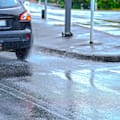A school principal says one of his classes had numbers cut by half after a gastroenteritis outbreak at a Canterbury campground.
Six children were hospitalised, 10 people were sick, and 37 others were probably sick from E.coli contaminated water at Hanmer Springs Forest Camp last month.
Water regulator Taumata Arowai has described the E.coli contamination as "the worst case scenario" and said the camp's drinking water supply was the likely source of the illness.
St Martin's principal Andrew Mouat said around 120 year five and six students attended camp in the second to last week of last term.
The school noticed more children than usual suffering from car sickness on the trip back to Christchurch, but didn't realise there was a gastroenteritis outbreak until parents started to phone in absences the following week.
"During that week, in one class that normally has about 28 children, we had about 12 at school."
The camp had not made contact with the school, he said.
While he wouldn't rule out returning, if it did, the school would ensure it minimised risk and look at taking its own water in the future.
Mouat wanted to see assurances around testing and water quality available for schools.
"I think that's definitely something we'll look at for our camps going forward - if they are on a private water source, how can we be assured the water source is safe? What sorts of testing have you done? Has someone cleared it?"
Mouat said he was relieved students seemed to have bounced back, especially for the year five children who were on their first school camp.
"Look, camps for school kids are just the best time ever. Even though this did happen, our kids are very resilient, and they've come back saying they still enjoyed the camp experience."
RNZ has approached Hanmer Springs Forest Camp for comment.
It was the third reported instance of e.coli contamination at the North Canterbury campground in less than a year.
The National Public Health Service (NPHS) confirmed three schools that stayed at the camp were linked to the outbreak.
Medical officer of health Dr Cheryl Brunton said of the 47 suspected and confirmed cases, 40 were children.
All six hospitalised were children, Brunton said.
Taumata Arowai spokesman, Steve Taylor, said the regulator issued a direction to the camp on 17 September, which required a boil water notice be put in place and that every visitor be advised that drinking water was or could be unsafe.
"That direction will remain in place until such time as we're satisfied that there is safe drinking water being made available," Taylor said.
The camp is one of an unknown number of unregistered supplies around the country.
Estimates varied widely, but it's thought there could be between 8000 and 75,000 unregistered water schemes in the country.
Under legislation introduced in 2021, they have until 2028 to register with Taumata Arowai and abide by testing and monitoring rules.
Hurunui District Council chief executive Hamish Dobbie said he wasn't aware of any previous E.coli issues at the campground.
"It's a private supply so it doesn't fall under our jurisdiction until there's a problem," Dobbie said.
He said the council had been in touch with the camp about what assistance it might need to improve the water supply.
But data from Taumata Arowai showed the camp's water breached E.coli limits in samples from October 2024 and February 2025.
The regulator said it did not have information available from prior to its creation in 2021.
'They had to put a tube through her nose into her stomach'
John and Sue Warwick's 10-year-old daughter Yanni spent 10 days in hospital.
The Warwicks said her health worsened after she returned from camp, and she was hospitalised three days later, with a fever and bloody diarrhoea.
"She wasn't eating, so they had to put a tube through her nose into her stomach and feed her that way," John Warwick said.
Tests confirmed the girl was suffering from STEC.
Warrick said he did not want anyone else to go through what his family had.
"They need to make sure the systems and checks are in place, and regular testing obviously."
He was worried information was not made public until Taumata Arowai issued a media release more than a month after Yanni's hospitalisation.
"There hasn't been much in the way of information come out of it, people aren't aware. If we'd had known we probably wouldn't have sent Yanni up there."
The family had not heard anything from the camp, he said.
Another girl became so sick she needed a blood transfusion.
Her parent, who RNZ agreed not to name, said their daughter was also diagnosed with STEC.
The 10-year-old's family was frustrated other schools went to the camp after their daughter fell ill, and angry about what she had experienced.
"It's not a nice thing to go through, to see your daughter suffer like that."
The girl told her family she doesn't want to go on camp again.
"I think they've all been let down really," her parent said.
NPHS was advised of the outbreak on 15 September, but even after the camp's water supply was assessed to be the most likely source, on 17 September, further children became ill.
"Unfortunately, additional cases were identified after 17 September as one school group arrived before the boil water advisory was in effect," Brunton said.
By Keiller MacDuff of rnz.co.nz





















SHARE ME